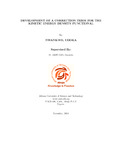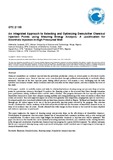| dc.description.abstract | Nigeria, a nation endowed with diverse energy resources, faces a complex energy landscape characterized by historical reliance on fossil fuels, energy security challenges, and environmental concerns. Diversifying the energy mix is essential to balance the need for cost-effective electricity generation with the imperative of reducing greenhouse gas emissions. This study aims to develop a comprehensive energy mix optimization model for Nigeria. The objectives are twofold: first, to minimize the total cost of electricity generation while maximizing energy security, and second, to reduce greenhouse gas emissions to meet international environmental commitments.
The research employs a quantitative approach, utilizing mathematical optimization techniques and scenario-based analysis. Decision variables are defined to represent the percentage allocation of gas, hydro, wind, and solar energy sources. The model integrates data on capacity, energy demand, cost per megawatt, and CO2 emissions to assess different energy mix scenarios. Scenario results are visualized using graphs and charts, enabling policymakers and stakeholders to make informed decisions. The study produces a range of optimized energy mix scenarios for Nigeria, considering total energy generation from 25GW to 200GW. These scenarios reflect the trade-offs between cost, renewable energy integration, and carbon emissions reduction. Sensitivity analysis is conducted to assess the robustness of the results. The findings of this study have significant policy implications. They inform decisions related to energy planning, emissions reduction targets, and energy security. The study contributes to Nigeria's commitment to environmental sustainability and aligns with international efforts to combat climate change. Optimizing Nigeria's energy mix is critical for economic stability, energy security, and environmental sustainability. This study provides a structured framework for addressing these challenges, offering practical solutions and policy recommendations that can guide the nation toward a brighter and more sustainable energy future.
The study's findings aim to strike a balance between economic efficiency and environmental responsibility, reflecting Nigeria's commitment to a sustainable and resilient energy sector. | en_US |



